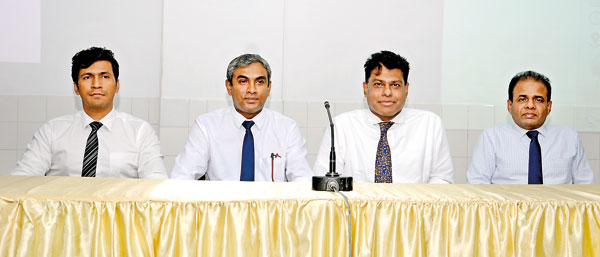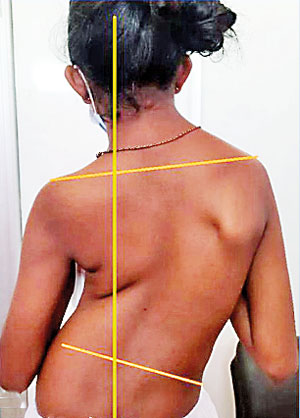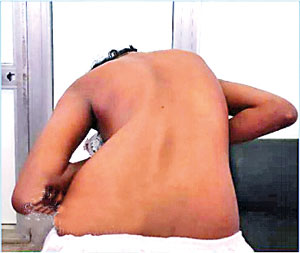News
SL has doctors, technology and facilities to treat scoliosis
View(s):- ‘Don’t be misled into taking your child abroad’, one of many messages to be highlighted at ‘Scoliosis Awareness Walk’ on June 23
By Kumudini Hettiarachchi
It is all for the sake of keeping the spine straight – as ‘early detection’ and ‘timely intervention’ are essential in the battle against scoliosis.
It is also to underscore that Sri Lanka has the medical expertise, technology and facilities for the management of scoliosis including correction, if necessary, through even the most complex surgeries, on par with developed countries, all for free in the state sector.

From left: Dr. M.S. Hameed, Dr. Nirmal Marasinghe, Dr. Hiran Amarasekera and Dr. V. Swarnakumar.Pic by Priyanka Samaraweera
Along with these important messages, there would also be an urgent plea not to be misled by groups with vested interests bent on making money, who encourage parents to take their children abroad for such surgery. Not only would it cost a lot of money, sometimes for substandard care and facilities, but also on the child’s return to Sri Lanka follow-up and addressing of complications would pose a huge problem. The parents and children would be compelled to keep returning to the country where the surgery was done, at great cost.
These are the multi-pronged messages that would be given loud and clear, as marchers in blue, green and white T-shirts, not protesters, carrying informative posters wend their way along the streets of Colombo next Sunday, June 23, as part of the ‘Scoliosis Awareness Walk 2024’. The National Scoliosis Awareness Day, meanwhile, is on June 26.
The announcement about the walk as well as a detailed but brief description of scoliosis, the large network of state hospitals available for its treatment and the need for parents to check their children for early signs of the disease, was made by an eminent panel of Orthopaedic Surgeons on Wednesday.
The panel comprised Dr. Nirmal Marasinghe of the Lady Ridgeway Hospital (LRH) for Children, Colombo; Dr. V. Swarnakumar, just retired from the National Hospital of Sri Lanka (NHSL); Dr. M.S. Hameed of the Badulla Teaching Hospital; and Dr. Hiran Amarasekera of the Neville Fernando Teaching Hospital, Malabe.
Scoliosis is the disfiguring ‘S’ shaped deformity of the spine, said Dr. Marasinghe, stressing that the deformity progresses with age and development. In severe cases, it can affect heart and lung functions of the child. The psychological effects should also not be underestimated.
The types of scoliosis are:
n Congenital (from birth) scoliosis– occurring due to birth defects of the spine, the spinal bones of these children are not formed, not properly formed or are fused some times.
n Neurogenic scoliosis– this comes about when children with neurological problems such as meningomyelocele and cerebral palsy sometimes develop scoliosis.
n Syndromic scoliosis – this occurs in association with other genetic conditions such as Down’s syndrome, Marfan’s syndrome and neurofibromatosis.
n Adolescent idiopathic scoliosis – the commonest form of scoliosis, this affects children in adolescence close to puberty (coming of age). The cause is yet to be determined. More girls than boys (10:1) are affected, with girls having a 30% higher chance of developing a severe form of scoliosis.
The treatment would depend on the age of presentation, pointed out Dr. Marasinghe, reiterating that a majority of curvatures could be managed conservatively with casting and bracing. If the deformity (curve) is small, it stops progressing at bone maturity, once the child is grown. Casting and bracing can prevent progression. If the child is not old enough, a method called ‘growing rods’ is used, with the rods being lengthened (elongated) every 6 months after the initial surgery, to achieve adequate height for the child.
“It is only severe deformities (>50 degrees) that will require corrective surgery,” he says.
The panel said that parents need to be made aware that early detection and timely intervention can prevent severe deformity, thus reducing the number of children needing surgery. Surgery does carry risks, therefore, only those with >50-degree curves are considered for surgery.
Even though world data indicate that only 10% of scoliosis patients would need surgery, regrettably, in Sri Lanka the number is higher as they come for treatment quite late. However, they assured that scoliosis-correction surgery can be done safely in Sri Lanka and even the most complex surgeries are all for free in the state sector though the implants needed cost as much as Rs. 1.5 million per child.
Meanwhile, they requested the health authorities to look into the issues of Orthopaedic Spine Surgeons (10 Consultants have already trained in this line of work and 3 more are currently in overseas training) who have returned to Sri Lanka after specialized training but are currently serving in places where there are no facilities to perform scoliosis surgery.
“Either give them the facilities at their current stations or transfer them to stations where there are adequate facilities,” the panel said, adding that as scoliosis surgery requires implants and instruments which are quite expensive, if a steady supply is not there in the state sector, they would not be able to serve these children to their fullest capacity.
| Join the Walk on June 23Come join us for the ‘Scoliosis Awareness Walk 2024’ to spread the message, is the invitation from the Sri Lanka Orthopaedic Association (SLOA) and its branch the Sri Lanka Spine Society (SLSS). Those participating in the walk which kicks off at 7 a.m. on Sunday, June 23, at the Lady Ridgeway Hospital (LRH) for Children (Maradana Road entrance) will wend their way through the Borella Cross Road to the College of Surgeons of Sri Lanka on Independence Avenue, Colombo 7.
| |
 How to spot scoliosis earlyThis is how you may spot whether your child is having scoliosis, say these Orthopaedic Surgeons, giving two ways on how to do so. How to spot scoliosis earlyThis is how you may spot whether your child is having scoliosis, say these Orthopaedic Surgeons, giving two ways on how to do so.
This is while scoliosis-correction surgery is performed at the National Hospital of Sri Lanka, Colombo; the Lady Ridgeway Hospital (LRH) for Children, Colombo; the Jaffna Teaching Hospital and the Badulla Teaching Hospital. |
The best way to say that you found the home of your dreams is by finding it on Hitad.lk. We have listings for apartments for sale or rent in Sri Lanka, no matter what locale you're looking for! Whether you live in Colombo, Galle, Kandy, Matara, Jaffna and more - we've got them all!


 These doctors urge parents who spot a deformity to take the child to the nearest Orthopaedic Clinic, while also requesting the medical community if they see this condition, to refer the patients to these clinics, as all Orthopaedic Surgeons are trained to manage early scoliosis.
These doctors urge parents who spot a deformity to take the child to the nearest Orthopaedic Clinic, while also requesting the medical community if they see this condition, to refer the patients to these clinics, as all Orthopaedic Surgeons are trained to manage early scoliosis.